You are using an out of date browser. It may not display this or other websites correctly.
You should upgrade or use an alternative browser.
You should upgrade or use an alternative browser.
Trauma Kit
- Thread starter Downeast
- Start date
- Replies 45
- Views 579
Putting one together is almost certainly cheaper than buying a premade kit and has the added advantage of containing only items that you are familiar with and plan on using. As far as what goes in it, that is based entirely on your experience/skill/comfort level and willingness to perform various interventions. Stop the bleed classes are a great place to start and are often free. They will give you some basic training as well as provide you with an idea of what to put in your kit.
Chuckman
Senior Member
This is kinda in my and @363medic wheelhouse. I advocate a general first aid kit and supplement with some trauma stuff. Or two separate kits. I am partial to Adventure Medical Kits (https://adventuremedicalkits.com/) and North American Rescue Products (https://www.narescue.com/) or Tactical Medical Solutions (https://tacmedsolutions.com/) for trauma-specific kits. But you can look at them and source the supplies and roll your own.
And training. Train, train, train.
And training. Train, train, train.
Thanks for the ideas. Does the Red Cross still offer first aid classes? I'm trying to get some of my friends that I shoot with to get together for at least a basic course. It's a start.
An active duty GB friend of mine is going to put together a kit for me. That should be a good start.
An active duty GB friend of mine is going to put together a kit for me. That should be a good start.
Chuckman
Senior Member
Thanks for the ideas. Does the Red Cross still offer first aid classes? I'm trying to get some of my friends that I shoot with to get together for at least a basic course. It's a start.
An active duty GB friend of mine is going to put together a kit for me. That should be a good start.
Stop the Bleed (mentioned earlier) is a great start, focused on penetrating trauma (GSWs, but could be anything). usually free and some places done in an hour and a half or so. Check out American Red Cross and American Heart Association. If you want something a tad off the beaten path, check with REI to see if they are offering something like wilderness first aid.
As far as a trauma-specific kit, they are all essentially the same, just variations on a theme. You might get 'this' tourniquet verses 'that' tourniquet, or 'this' bandage instead of 'that' bandage, but they are all more or less identical. So yeah, the kit your friend builds for you, should be just fine.
Last edited:
Classes are a great start but the hands on from an emt class (paramedic training is better) gives you the practice and confidence. Seeming that sucking chest wound or treating that open fracture is a lot different. Being rural, we had farm medic and tactical medic training which I enjoyed both.
The vast majority of pre-made kits are stuffed with junk you will never use, and/or charge you alot of money for a cheap bag stuffed with a Chinese tourniquet, some gloves, cheap 4x4s, chinese quick clot and some Kling. Build your own as far as skill level and perceived uses.
Chuckman
Senior Member
Classes are a great start but the hands on from an emt class (paramedic training is better) gives you the practice and confidence. Seeming that sucking chest wound or treating that open fracture is a lot different. Being rural, we had farm medic and tactical medic training which I enjoyed both.
I think EMT is about the 'maximum' cert unless people want to get into it on the rescue squad or as a job. Paramedic is way overkill for 99% of people. Really most people are just fine with a basic first aid class and BLS.
The vast majority of pre-made kits are stuffed with junk you will never use, and/or charge you alot of money for a cheap bag stuffed with a Chinese tourniquet, some gloves, cheap 4x4s, chinese quick clot and some Kling. Build your own as far as skill level and perceived uses.
For the most part I agree. I do like AMK, I think they are smartly packed. Most of what you get on Amazon is junk, as are those industrial-type kits.
It may be but how many actually need a trauma kit that makes a life altering outcome.I think EMT is about the 'maximum' cert unless people want to get into it on the rescue squad or as a job. Paramedic is way overkill for 99% of people. Really most people are just fine with a basic first aid class and BLS.
For the most part I agree. I do like AMK, I think they are smartly packed. Most of what you get on Amazon is junk, as are those industrial-type kits.
Chuckman
Senior Member
It may be but how many actually need a trauma kit that makes a life altering outcome.
I dunno. But most contents of an IFAK is covered in Stop the Bleed. Basic first aid and CPR are just skills that everyone should know.
Agreed, I think the knowledge is more valuable than the actual kit.I dunno. But most contents of an IFAK is covered in Stop the Bleed. Basic first aid and CPR are just skills that everyone should know.
You’re not wrong but couldn’t the same thing be said about concealed carry?It may be but how many actually need a trauma kit that makes a life altering outcome.
I do agree with you that there is no substitute for experience but joining a rescue/EMS service is a pretty huge commitment and not always feasible.
Absolutely could be the same with concealed carry, I was just thinking the same thing, but point bang is a lot simpler and easy to practice. It’s pretty difficult getting hands on with a major trauma or even just a fracture. I guess I said medic due to the mandated hours of experience required, obviously drugs and all that is not as important for this discussion. If phtls was available for non EMS, that’s a good course, short of the als techniques in it.You’re not wrong but couldn’t the same thing be said about concealed carry?
I do agree with you that there is no substitute for experience but joining a rescue/EMS service is a pretty huge commitment and not always feasible.
Chuckman
Senior Member
Absolutely could be the same with concealed carry, I was just thinking the same thing, but point bang is a lot simpler and easy to practice. It’s pretty difficult getting hands on with a major trauma or even just a fracture. I guess I said medic due to the mandated hours of experience required, obviously drugs and all that is not as important for this discussion. If phtls was available for non EMS, that’s a good course, short of the als techniques in it.
I actually had this conversation with another member here who asked me about PHTLS for him and his son. I wish there were a better alternative that was more trauma-centric for non-medical providers. Maybe I should come up with one.
Add a tourniquet like the CAT Gen 7 or SOF T and combat gauze. Arterial bleeds are pretty significant and need to be stopped immediately. Hypothermia is a killer in trauma patients so Also add a blanket either a cheap emergency space blanket or something like this. https://www.rescue-essentials.com/apls-emergency-blanket/"Any ideas or recommendations?"
well, i built my own using a tackle box.
here is a web image which is similar:
View attachment 758160
Last edited:
Chuckman
Senior Member
Add a tourniquet like the CAT Gen 7 or SOF T and combat gauze. Arterial bleeds are pretty significant and need to be stopped immediately. Hypothermia is a killer in trauma patients so Also add a blanket either a cheap emergency space blanket or something like this. https://www.rescue-essentials.com/apls-emergency-blanket/
There's emerging data that hemostatics don't work better or have better outcomes than regular gauze. I still have it and If I don't use it before it expires it'll go into my training crate, but at this point I'm not going to replace it. I totally agree about hypothetical, not enough people pay attention to that.
I agree, I personally have found regular old compressed z pack gauze worked just as well to control junctional wounds. Not to mention it is cheaper tooThere's emerging data that hemostatics don't work better or have better outcomes than regular gauze. I still have it and If I don't use it before it expires it'll go into my training crate, but at this point I'm not going to replace it. I totally agree about hypothetical, not enough people pay attention to that.
NCMedic
Memento Mori
2A Bourbon Hound 2024
2A Bourbon Hound OG
Charter Member
Benefactor
Vendor
Life Member
Multi-Factor Enabled
There's emerging data that hemostatics don't work better or have better outcomes than regular gauze. I still have it and If I don't use it before it expires it'll go into my training crate, but at this point I'm not going to replace it. I totally agree about hypothetical, not enough people pay attention to that.
Probably because people fail to understand how to actually use it as intended... to pack a wound, which makes a lot of folks queezy.
NCMedic
Memento Mori
2A Bourbon Hound 2024
2A Bourbon Hound OG
Charter Member
Benefactor
Vendor
Life Member
Multi-Factor Enabled
This is what I put in all of our vehicles at work
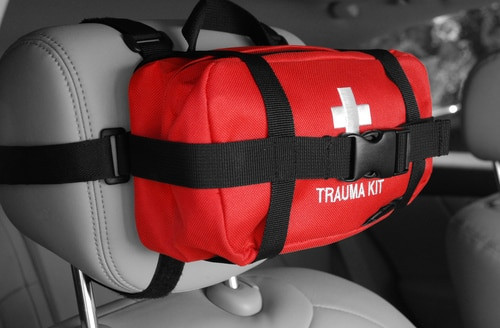
 www.rescue-essentials.com
www.rescue-essentials.com
They added a second TQ, emergency blanket, 2 60 min high intensity white chem lights when I ordered them.
All mounted on the passenger side headrest
combined with this
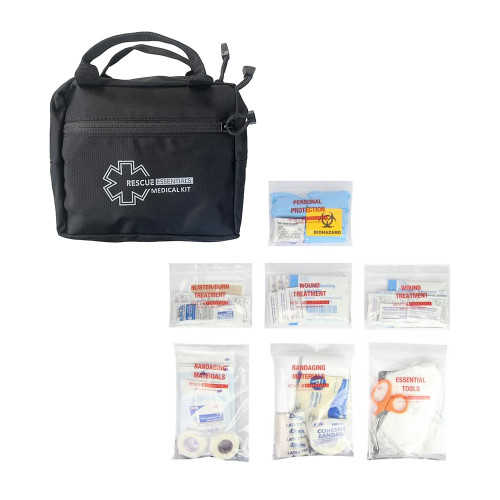
 www.rescue-essentials.com
www.rescue-essentials.com
First-aid kit clipped to the mount for the IFAK
and this for everyone's backpack
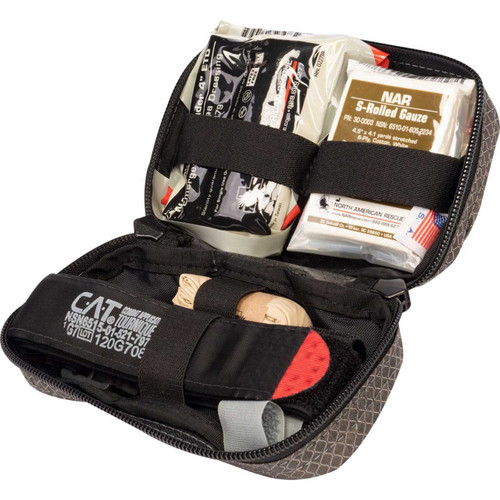
 www.rescue-essentials.com
www.rescue-essentials.com

Mutual Aid Trauma (MAT) Kit
The Mutual Aid Trauma (MAT) kit was developed to aid effective deployment of medical resources during shared calls.
 www.rescue-essentials.com
www.rescue-essentials.com
They added a second TQ, emergency blanket, 2 60 min high intensity white chem lights when I ordered them.
All mounted on the passenger side headrest
combined with this

LE Vehicle First Aid Kit
This is a good general use kit in a 420 Denier Nylon case with red zipper pulls and a subdued logo identifying it as a medical kit. Contains adequate supplies to treat a number of injuries. Extra Gloves and Hand Wipes allow treatment of multiple patients.
 www.rescue-essentials.com
www.rescue-essentials.com
First-aid kit clipped to the mount for the IFAK
and this for everyone's backpack

NAR Ocho IFAK - Basic
An everyday carry IFAK that contains the necessary tools to respond to penetrating, blast, or other traumatic injuries.
 www.rescue-essentials.com
www.rescue-essentials.com
I didnt look at every kit. Make sure to have a survival blanket. They are small to throw in a kit and easy to unfurl and shock is a killer. Got to keep em warm til transport arrives. That can be long sometimes.
I do like the 4 in NAR flat dressings. I find them to be more user friendly than the Israeli bandage types with the compression/pressure bar thing, I know it does have the plastic piece at the end to secure it to itself however. I just find them easier to explain to a LEO or lay person in stop the bleed classesThis is what I put in all of our vehicles at work

Mutual Aid Trauma (MAT) Kit
The Mutual Aid Trauma (MAT) kit was developed to aid effective deployment of medical resources during shared calls.www.rescue-essentials.com
They added a second TQ, emergency blanket, 2 60 min high intensity white chem lights when I ordered them.
All mounted on the passenger side headrest
combined with this

LE Vehicle First Aid Kit
This is a good general use kit in a 420 Denier Nylon case with red zipper pulls and a subdued logo identifying it as a medical kit. Contains adequate supplies to treat a number of injuries. Extra Gloves and Hand Wipes allow treatment of multiple patients.www.rescue-essentials.com
First-aid kit clipped to the mount for the IFAK
and this for everyone's backpack

NAR Ocho IFAK - Basic
An everyday carry IFAK that contains the necessary tools to respond to penetrating, blast, or other traumatic injuries.www.rescue-essentials.com
This is kinda in my and @363medic wheelhouse. I advocate a general first aid kit and supplement with some trauma stuff. Or two separate kits. I am partial to Adventure Medical Kits (https://adventuremedicalkits.com/) and North American Rescue Products (https://www.narescue.com/) or Tactical Medical Solutions (https://tacmedsolutions.com/) for trauma-specific kits. But you can look at them and source the supplies and roll your own.
And training. Train, train, train.
What's the best for one to start looking for or getting into basic trauma training? Not looking for full time job, just some of the stuff you guys talked about on here. I live in wnc, near Trasheville.
Last edited:
Chuckman
Senior Member
What's the best for one to start looking for or getting into basic trauma training? Not looking for full time job, just some of the stuff you guys talked about on here. I live in wnc, near Trasheville.
Basic? Tourniquet, and bandaging/dressing material. That's about as basic as it gets.
Chuckman
Senior Member
What's the best for one to start looking for or getting into basic trauma training? Not looking for full time job, just some of the stuff you guys talked about on here. I live in wnc, near Trasheville.
This is a good 'basic' kit:
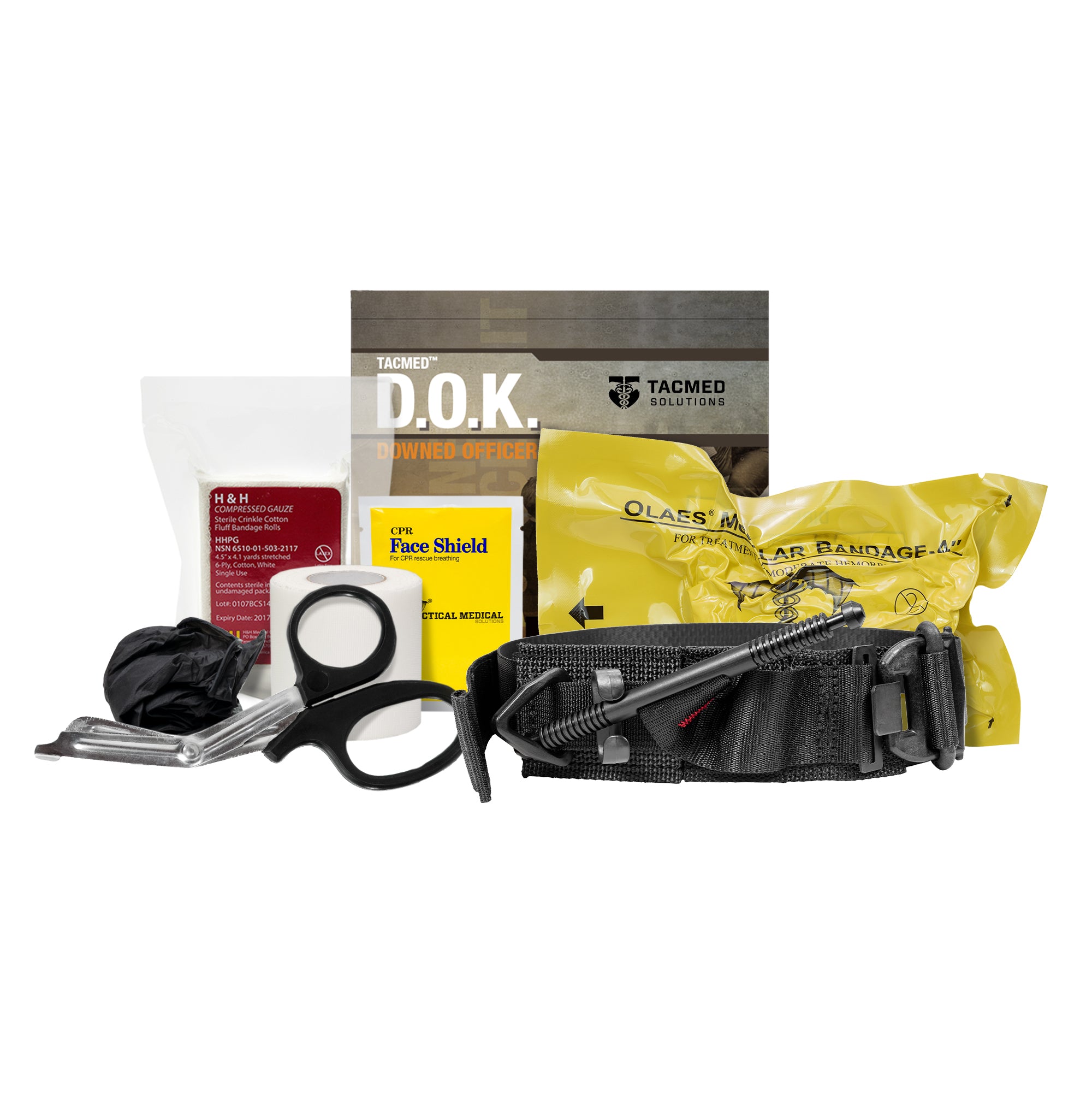
TacMed™ Downed Officer Kit
The TacMed™ Downed Officer Kit is a compact kit that contains the items essential for treatment of serious injuries encountered by law enforcement and military personnel. The DOK is compact enough to fit in a cargo pocket or glove box. It can also mount to a roll bar/ protective shield in a...
I have a few I offer from NAR
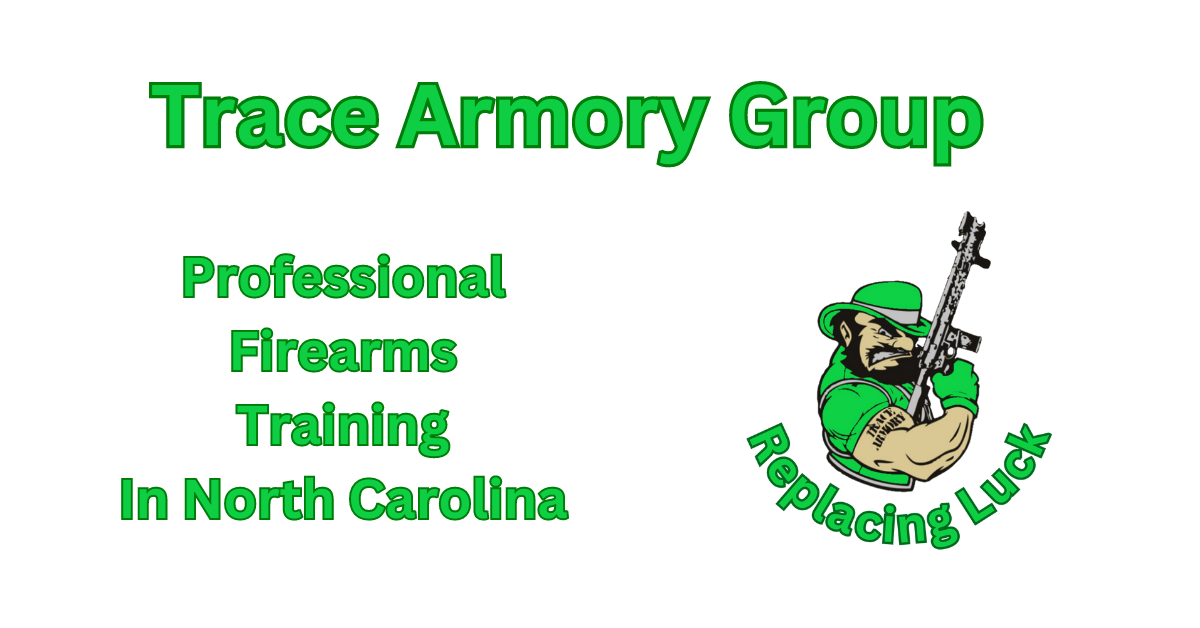
 tracearmorygroup.com
tracearmorygroup.com

Everyday Carry (EDC)
Welcome to the world of Everyday Carry (EDC), where functionality meets style and preparedness is paramount. In this collection, you'll find an array of meticulously curated items designed to seamlessly integrate into your daily life, ensuring you're always equipped for whatever challenges may...
 tracearmorygroup.com
tracearmorygroup.com
Chuckman
Senior Member
I have a few I offer from NAR

Everyday Carry (EDC)
Welcome to the world of Everyday Carry (EDC), where functionality meets style and preparedness is paramount. In this collection, you'll find an array of meticulously curated items designed to seamlessly integrate into your daily life, ensuring you're always equipped for whatever challenges may...tracearmorygroup.com
NAR, TMS, and Chinook are pretty much 'the standard'. Some people like Dark Angel, but I have a problem with price gouging. Same to be said for Matbok and Phokus.
I tell people to look at the sites, find the items they like, get the items, then just get the nylon bag of your choice on the classified here, eBay, wherever. Of course there is something to be said for just buying it once and being done with it. Some people--most people---don't nerd out on medical gear like I do.
Some people--most people---don't nerd out on medical gear like I do.
What about medical training for joe-shmoos? Where can we get that? I'm not wanting a brain surgery degree on a burger King budget, but some kind of training/classes thst could help us use the kits we buy. Videos are good, on hand in person is better.
Chuckman
Senior Member
What about medical training for joe-shmoos? Where can we get that? I'm not wanting a brain surgery degree on a burger King budget, but some kind of training/classes thst could help us use the kits we buy. Videos are good, on hand in person is better.
Google 'Stop the Bleed.' It's backed by the American College of Surgeons and often free, takes about 2-3 hours. Not real close to you I do see some in Charlotte.
Ok, I will look into them tonight when I'm "working" lol wish they had some closer. 2 to 3 hrs seems so short, I will have to google fu some and see if there are classes around my area that aren't expensive to take.
Chuckman
Senior Member
Ok, I will look into them tonight when I'm "working" lol wish they had some closer. 2 to 3 hrs seems so short, I will have to google fu some and see if there are classes around my area that aren't expensive to take.
Stop the Bleed is definitely low fruit, focused on the layperson. You will know how to, well, stop the bleed: use a tourniquet, apply direct pressure, pack a wound.
Anything beyond that is basic first aid. The 'tactical' med classes are just more application of these things, really, but you also get a lot more hands-on and application. You can also try some place like REI or local outdoors shops, they sometimes have something like wilderness first aid.
Check out this group they do good classes but nothing replaces butts in seats class time for the hands on aspect BUT it’s a start and beats nothing.
Last edited:
Id say start looking into wilderness medicine courses. The advantage of these as opposed to other first aid courses is that they tend to focus more on injuries and point of care treatment while putting less emphasis on the process of activating and coordinating with the EMS system and other medicolegal concerns. The other advantage is that you will likely learn improvise and to do "more with less", which means that you will figure out are the true essential items for your med kit.What about medical training for joe-shmoos? Where can we get that? I'm not wanting a brain surgery degree on a burger King budget, but some kind of training/classes thst could help us use the kits we buy. Videos are good, on hand in person is better.
There are quite a few courses available in western NC and they range in skill level from the layperson up to physicians looking to expand into austere medicine. Its been a while but I have taken quite a few of these in the past and I always got something out of them. NOLS, SOLO, etc are some of the big names but I cant really say that any are superior. I would look around and see what offerings line up with your skill level/training desire/budget.
georgel
Behind Every Blade of Grass
Charter Member
Benefactor
Supporting Member
Multi-Factor Enabled
I went through and certified as a Wilderness First Responser (WFR) and highly recommend it. What's different is that you focus on treatment and care vs stabilize and transport, which is the urban model, when a hospital or other medical care facility is available. "You're not getting out soon and no one is coming to help." is the mantra. You're on your own.
But the commitment is big, 90hrs in 8 days. (I think EMT is 200hrs.) I did mine with National Outdoor Leadership School (NOLS) in Sylva. The instructor is also a lead EMT/Paramedic instructor. It's immersive, you live it all week. You're hiking out, wading into streams to extract victims, working in the dark by headlamp, working with moulaged victims who will throw up on you, screaming in your face, etc. It's great!
There is a 3 day short course, but you don't get the WFR certification.
Not much about penetrating combat wounds though. I took a TCCC class for that. I hear TCCC is now only available to EMT level providers or above.
But the commitment is big, 90hrs in 8 days. (I think EMT is 200hrs.) I did mine with National Outdoor Leadership School (NOLS) in Sylva. The instructor is also a lead EMT/Paramedic instructor. It's immersive, you live it all week. You're hiking out, wading into streams to extract victims, working in the dark by headlamp, working with moulaged victims who will throw up on you, screaming in your face, etc. It's great!
There is a 3 day short course, but you don't get the WFR certification.
Not much about penetrating combat wounds though. I took a TCCC class for that. I hear TCCC is now only available to EMT level providers or above.
Last edited:
I'd suggest two kits. A small IFAK sized one for life threatening emergencies - and then a larger boo boo box with band aids, ice packs, etc...
Keeps things nice and organized if anything gets gnarly.
North American Rescue runs some pretty solid sales quite often. Don't pay full price for their kits.
Cheap Amazon bags are fine for a truck bag, hell even tupperware works. Cheap Amazon tourniquets are not - but they are good for training. It's worthwhile to pick up a crappy kit with a bag, play around with the TQ, compressed guaze, etc - then stock it with quality items for real world use.
Bonus tip - I'm a huge fan of Coban (self-adhering wrap)for a multitude of things. 3M Vetwrap (animal stuff) is the same, and is 1/4 of the price.
Keeps things nice and organized if anything gets gnarly.
North American Rescue runs some pretty solid sales quite often. Don't pay full price for their kits.
Cheap Amazon bags are fine for a truck bag, hell even tupperware works. Cheap Amazon tourniquets are not - but they are good for training. It's worthwhile to pick up a crappy kit with a bag, play around with the TQ, compressed guaze, etc - then stock it with quality items for real world use.
Bonus tip - I'm a huge fan of Coban (self-adhering wrap)for a multitude of things. 3M Vetwrap (animal stuff) is the same, and is 1/4 of the price.
Do you have any Volunteer Fire Departments around?? If so, go and ask about a First Responder course.What about medical training for joe-shmoos? Where can we get that? I'm not wanting a brain surgery degree on a burger King budget, but some kind of training/classes thst could help us use the kits we buy. Videos are good, on hand in person is better.
Chuckman
Senior Member
Do you have any Volunteer Fire Departments around?? If so, go and ask about a First Responder course.
Yes! And if you volunteer, the classes are free.


